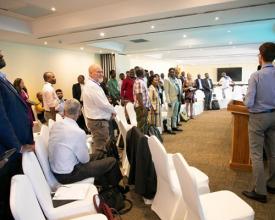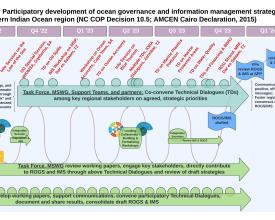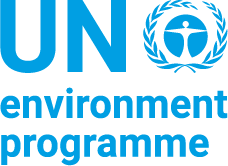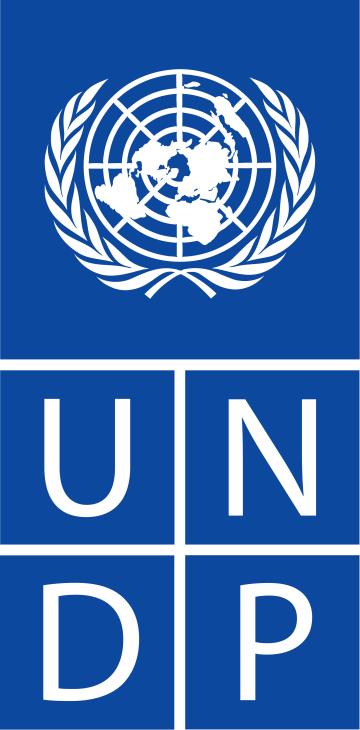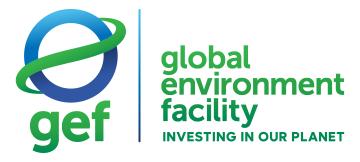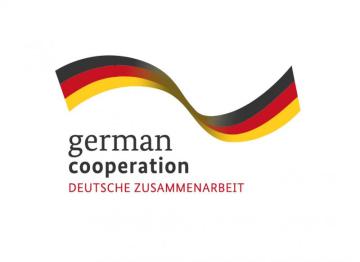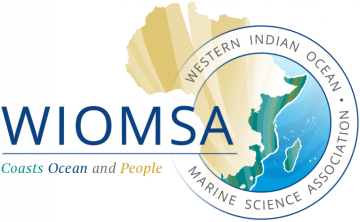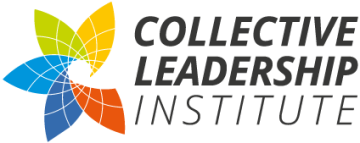
Creación conjunta de una estrategia de gobernanza oceánica para el Océano Índico occidental

La gobernanza regional de los océanos en el Océano Índico Occidental requiere una colaboración activa entre instituciones, países y partes interesadas para conseguir un océano sano y sostenible. Los líderes regionales reconocen la necesidad de mejorar la cooperación intersectorial para hacer frente a la triple crisis planetaria. El Convenio de Nairobi y sus socios apoyan el desarrollo conjunto de una estrategia regional de gobernanza de los océanos (ROGS), en respuesta a la Conferencia Ministerial Africana sobre Medio Ambiente y la Conferencia de las Partes del Convenio de Nairobi. A través de los Puntos Focales del Convenio de Nairobi, un Grupo de Trabajo de la ROGS con representantes de las Partes del Convenio, la Unión Africana y otras Comunidades Económicas Regionales, la Comisión del Océano Índico, el sector privado, la sociedad civil y expertos regionales dirige el diseño conjunto de diálogos técnicos que dan forma a la ROGS fomentando el consenso sobre acciones prioritarias y proponiendo acuerdos institucionales y de dotación de recursos. Un Equipo de Apoyo acogido por la Convención y compuesto por expertos de WIOMSA, GIZ y CLI apoya al Grupo Operativo.
Contexto
Défis à relever
El principal reto consistía en unir a diversos sectores y partes interesadas para una gobernanza regional colaborativa, superando la fragmentación institucional y los silos sectoriales. Fue crucial tender puentes entre las interacciones en línea y en persona para lograr una amplia participación y una inteligencia colectiva que sirvieran de base a las Estrategias Regionales de Gobernanza de los Océanos (ROGS). El consenso entre las comunidades económicas regionales (CER) y la Comisión del Océano Índico fue esencial. Este esfuerzo dio lugar a enfoques innovadores para abordar los retos sociales, económicos y medioambientales de la gobernanza de los océanos, como la seguridad marítima, la pesca regional, la prevención de la contaminación y la gestión eficaz de los recursos. Entre los principales resultados cabe citar
-
Seguridad marítima rentable.
-
Intercambio de información.
-
Armonización de políticas.
-
Colaboración en la gestión de la pesca.
-
Conservación del hábitat.
-
Apoyo a una economía azul sostenible mediante la cooperación regional en ciencia marina, capacitación y concienciación pública.
Ubicación
Procesar
Resumen del proceso
En respuesta a las decisiones de la AMCEN y de la Conferencia de las Partes en el Convenio de Nairobi, esta iniciativa tenía por objeto elaborar en colaboración una Estrategia Regional de Gobernanza de los Océanos (ROGS) y una Estrategia de Gestión de la Información (IMS). El proceso implicó a diversas partes interesadas del Océano Índico Occidental (OIO) a través de un enfoque participativo.
Los Puntos Focales del Convenio de Nairobi iniciaron el proceso, tal y como se muestra en la arquitectura del proceso que figura a continuación, estableciendo los Términos de Referencia para el Grupo de Trabajo de la ROGS, formado por múltiples actores y convocado a mediados de 2022. El Grupo de Trabajo, formado en liderazgo colectivo por la CLI, contribuyó a los Diálogos Técnicos, tanto en línea como en persona, para codesarrollar el contenido del ROGS. En estos diálogos participaron las principales partes interesadas, fomentando el consenso sobre las acciones, proponiendo acuerdos institucionales y debatiendo enfoques de dotación de recursos.
Kieran Kelleher, asesor de gobernanza oceánica, recopiló el borrador de las ROGS, que se compartió con los puntos focales del Convenio de Nairobi, los organismos regionales y los representantes de la UA en eventos celebrados en Tanzania y Mozambique en noviembre y diciembre de 2023. El enfoque inclusivo de co-desarrollo tenía como objetivo crear apropiación, mejorar la calidad, viabilidad y credibilidad de las ROGS.
Bloques de construcción
Voluntad política y mandato para elaborar una estrategia regional de gobernanza de los océanos
Los líderes políticos de los países de la Organización Mundial del Océano han reconocido que la cooperación entre las organizaciones regionales y entre los sectores, incluida una mayor participación del sector privado y la sociedad civil, es necesaria para hacer frente a los crecientes desafíos regionales, como la conservación marina y costera, la contaminación marina por plásticos, el cambio climático, la respuesta a desastres como los vertidos de petróleo o los ciclones, etc.
Una serie de procesos políticos sucesivos, incluido el llamamiento de 2015 de la Unión Africana (UA) para el desarrollo de una Estrategia Regional Africana de Gobernanza de los Océanos a través de la Declaración de El Cairo de la Conferencia Ministerial Africana sobre Medio Ambiente (AMCEN), la Declaración de Libreville de 2017 de la AMCEN, y un estudio de referencia sobre la Gobernanza de los Océanos de la WIO, condujeron al mandato para el desarrollo de la Estrategia Regional de Gobernanza de los Océanos de la WIO en la Conferencia de las Partes de 2021 del Convenio de Nairobi (NC) (Decisión CP.10/5). En respuesta, la Secretaría del Convenio de Nairobi convocó a un Equipo de Apoyo para ayudar a guiar un desarrollo participativo de la ROGS de la WIO trabajando con representantes de las Partes Contratantes del CN, la UA, las Comunidades Económicas Regionales (CER) de la WIO, la Comisión del Océano Índico, el sector privado y actores de la sociedad civil en un Grupo de Trabajo sobre la Estrategia Regional de Gobernanza de los Océanos.
Factores facilitadores
-
Contar con un mandato político de alto nivel es un importante factor de éxito para emprender un proceso participativo de múltiples partes interesadas en el desarrollo de la estrategia regional.
-
Selección de los miembros del grupo de trabajo por parte de los países, la UA y las RECS y, por tanto, participación de los países en la creación de la estrategia.
-
Apoyo financiero de proyectos y socios respaldados regionalmente
-
Capacidad de coordinación y coordinación de la NCS
Lección aprendida
-
Largo proceso hasta la adopción de la decisión en 2021 y prolongado periodo de preparación debido al amplio alcance y la diversidad de sectores y temas.
-
La coordinación de un proceso regional y político de estas características requiere capacidades continuas en todas las partes y una firme voluntad de participar activamente
-
Es necesario que exista continuidad y un proceso a largo plazo para desarrollar y aplicar la estrategia antes del inicio del proceso
-
Capacidad para enmarcar las cuestiones y los temas de forma que conduzcan al consenso a través de diálogos técnicos
-
Información eficaz a la TF sobre las posiciones consensuadas
Elaboración de la Estrategia Regional de Gobernanza de los Océanos mediante un proceso de cocreación
El equipo de apoyo al ROGS respaldó a un grupo de trabajo diverso de la WIO sobre el ROGS, en el que participaron representantes estatales y no estatales de diversos sectores y organizaciones. Este foro inclusivo facilitó el diálogo y la colaboración entre las partes interesadas, cuyos miembros hicieron aportaciones directas a las ROGS y ampliaron las contribuciones regionales invitando a las partes interesadas de sus redes. El Grupo de Trabajo, junto con las principales partes interesadas, aportó ideas estratégicas y técnicas a las ROGS a través de diálogos técnicos y actos regionales.
El Collective Leadership Institute (CLI) apoyó al Grupo de Trabajo mediante talleres presenciales y sesiones en línea para mejorar el liderazgo colectivo y la colaboración. Un asesor experimentado en gobernanza de los océanos, el Sr. Kieran Kelleher, desempeñó un papel clave en la formulación de preguntas estratégicas y en la compilación del contenido de las ROGS.
El enfoque inclusivo y participativo pretendía fomentar la apropiación, mejorando la calidad, viabilidad y credibilidad de las ROGS. Si se aprueba en la próxima Conferencia de las Partes del Convenio de Nairobi, se espera que esta apropiación impulse la aplicación de la estrategia.
Factores facilitadores
-
Proceso claro y objetivo definido en la arquitectura del proceso de elaboración conjunta de las ROGS.
-
Interés y apertura de los participantes para la contribución individual y colectiva
-
Desarrollo de capacidades y gestión del proceso priorizados por la CLI, haciendo hincapié en la participación auténtica, la creación de confianza y la cocreación.
-
Diálogos técnicos dirigidos por el grupo de trabajo, con la participación de partes interesadas y expertos de sectores específicos para lograr un entendimiento común y recomendaciones políticas óptimas.
-
Reuniones semanales en línea del equipo de apoyo del ROGS, organizadas por la CLI para garantizar un proceso de alta calidad.
Lección aprendida
-
Necesidad de asignar funciones claras dentro del proceso, incluida la de alguien que lo impulse de acuerdo con los plazos establecidos.
-
Liderazgo del proceso y liderazgo técnico
-
Consideración de la financiación y los recursos como parte integrante del ROGS
Impactos
- Marzo de 2022: La Secretaría del Convenio de Nairobi redactó los Términos de Referencia para el ROGS y el Grupo de Trabajo del ROGS.
- La aprobación por parte de los Puntos Focales de la CN llevó a las CER y a los Puntos Focales a designar representantes.
- Abril de 2022: Proceso inicial del ROGS que incluyó a actores estatales y no estatales que formaron un Grupo de Trabajo ROGS de múltiples partes interesadas.
- A continuación, el grupo de trabajo creó prioridades sectoriales, la estructura del ROGS y organizó los temas técnicos en cuatro grupos: i) seguridad marítima; ii) economía azul; iii) medio ambiente y recursos naturales; y iv) gestión del conocimiento y desarrollo de capacidades.
- Se celebraron sesiones presenciales y en línea de desarrollo de capacidades de liderazgo colectivo, incluido el Simposio WIOMSA en octubre de 2022 con una Sesión Especial sobre "Avances hacia una Estrategia Regional de Gobernanza Oceánica (ROGS) para el Océano Índico Occidental".
- Se celebraron diálogos técnicos clave en línea y en los Diálogos Oceánicos de la IORA en Zanzíbar en mayo de 2023, en los que participaron miembros del Grupo de Trabajo y partes interesadas de la WIO y del Océano Índico en general.
- Las ROGS serán revisadas por el Grupo de Trabajo, los Puntos Focales del Convenio de Nairobi y el público en el portal de la Comunidad de Práctica de la NCS.
- Las ROGS finales serán revisadas por las Partes Contratantes y presentadas a la COP del Convenio de Nairobi en 2024 para una posible decisión de adopción.
- El objetivo es inspirar la acción dentro de las Partes Contratantes para mejorar la gobernanza de los océanos en la WIO en beneficio de las comunidades costeras, las empresas y el medio ambiente.
Beneficiarios
-
Poblaciones de la WIO que dependen de ecosistemas marinos y costeros sanos (más de 65 millones de personas)
-
Partes contratantes del Convenio de Nairobi
-
Organizaciones regionales como las CER, organizaciones empresariales y de la sociedad civil
-
Participantes en el proceso de cocreación

